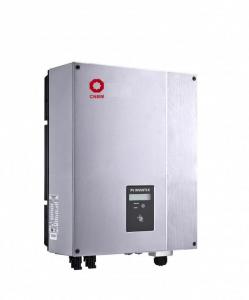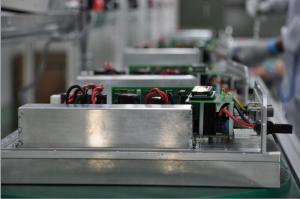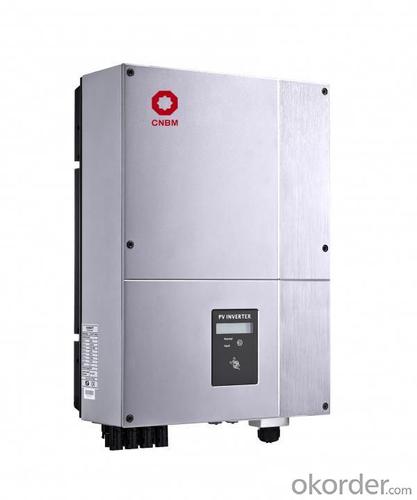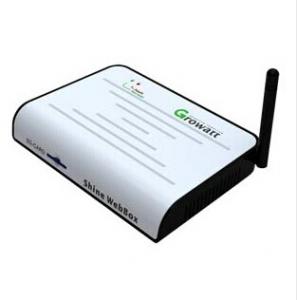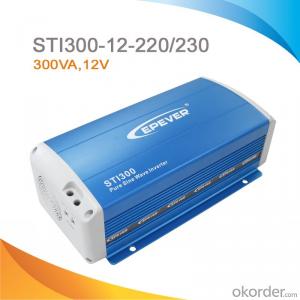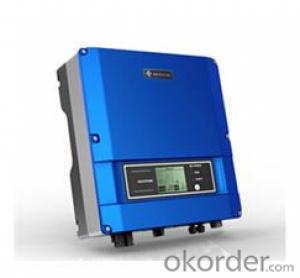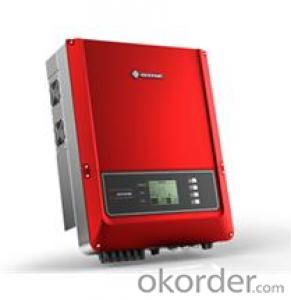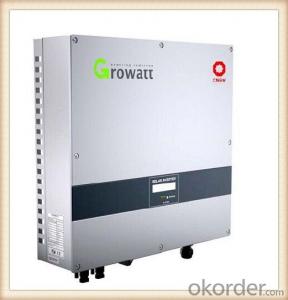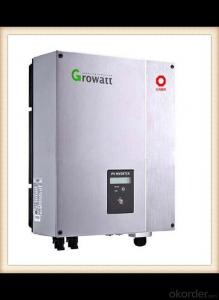Hyundai Solar Inverter CNBM-4200MTL Grid Tied Solar Inverter
- Loading Port:
- ShenZhen
- Payment Terms:
- TT
- Min Order Qty:
- 1 unit unit
- Supply Capability:
- 3000 per month unit/month
OKorder Service Pledge
OKorder Financial Service
You Might Also Like
Features of Grid Tied Solar Inverter CNBM-4200MTL
The full range of CNBM single phase inverters has received VDE, CE, G83/1, G59/2, ENEL2010, VDE4105, C10/C11, AS4777 etc.
With a R&D team more than 100 engineers,40% of the staff, who has been deeply engaged in the photovoltaic industry for 10 years, CNBM takes the mission to increase the inverter availability and efficiency, putting continuous innovation to make CNBM inverter easier for installation and operation, and more cost-effective for solar plant construction.Maximum efficiency of 97.8% and wide input voltage range, Internal DCswitch,MTL-String, Sound control,Bluetooth/RF technology /Wi-FiTransformerless,GT topology
Technical data of Grid Tied Solar Inverter CNBM-4200MTL
Model | CNBM-3600MTL | CNBM-4200MTL | |
Input data (DC) |
|
| |
Max. DC power | 3800W | 4200W | |
Max. DC voltage | 600V | 600V | |
Start voltage | 150V | 150V | |
PV voltage range | 100V-600V | 100V-600V | |
Max. input current | 10A | 15A | |
Number of MPP trackers /strings per MPP tracker | 2/2 | 2/2 | |
Output (AC) |
| ||
Rated AC output power | 3600W | 4200W | |
Max. AC power | 3600W | 4200W | |
Max. output current | 18A | 21A | |
Power factor | 1 | 1 | |
THDI | <3% | <3% | |
AC connection | Single phase | Single phase | |
Efficiency |
| ||
Max. efficiency | 97.6% | 97.9% | |
Euro weighted efficiency | 97% | 97.4% | |
MPPT efficiency | 99.5% | 99.5% | |
Protection devices |
| ||
Output over voltage protection-varistor | yes | yes | |
Ground fault monitoring | yes | yes | |
Grid monitoring | yes | yes | |
General Data |
| ||
Dimensions (W / H / D) in mm | 360/510/188 | 360/510/188 | |
Weight | 24KG | 24KG | |
Operating temperature range | –25°C ... +60°C | –25°C ... +60°C | |
Altitude | 2000m(6560ft) without derating | ||
Self-Consumption night | < 0.5 W | < 0.5 W | |
Topology | Transformerless | ||
Cooling concept | Natural | Natural | |
Environmental Protection Rating | IP65 | IP65 | |
Features |
| ||
DC connection | H4/MC4(opt) | H4/MC4(opt) | |
Display | LCD | LCD | |
Interfaces: RS485/RS232/Bluetooth / RF/Zigbee/Wifi | yes/yes/opt/opt/opt | ||
Warranty: 5 years / 10 years | yes /opt | ||
Certificates and approvals | CE、VDE 0126-1-1、DK5940、G83/1-1、G59/2、RD1663、EN50438、 VDE-AR-N4105、CEI-021、IEC-62109、ENEL-Guide | ||
CNBM-4200MTL is simple national setting of line supply monitoring, Easy country configuration, with Multi-language,display, currently available for most of the countries over the world.With technical creativity and scientific management, the factory established first class R&D and test centers, as well as management and R&D teams comprising of PhDs and masters with overseas qualification.
Figure 1 the application of Grid Tied Solar Inverter CNBM-4200MTL
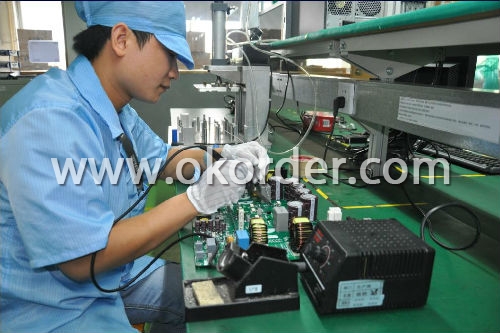
Figure 2 The Stock of Grid Tied Solar Inverter CNBM-4200MTL
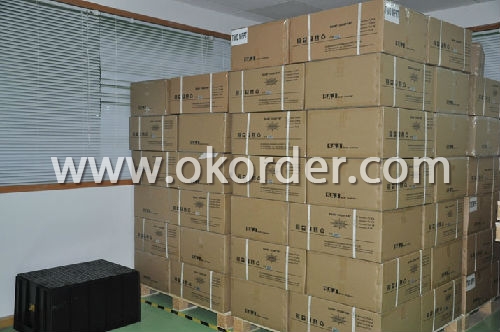
- Q: How does a solar inverter work?
- A solar inverter works by converting the direct current (DC) electricity produced by solar panels into alternating current (AC) electricity that can be used to power household appliances and be fed into the electrical grid. It performs this conversion by using electronic components, such as transistors and capacitors, to change the voltage and frequency of the electricity. The inverter also monitors the solar panel's output and adjusts its operation to ensure optimal performance and efficiency.
- Q: Can a solar inverter be used with different monitoring platforms?
- Yes, a solar inverter can typically be used with different monitoring platforms. Most modern solar inverters are designed to be compatible with various monitoring platforms, allowing users to choose the one that suits their needs and preferences. This flexibility enables users to monitor and manage their solar energy production and consumption effectively, regardless of the specific monitoring platform they choose to use.
- Q: Can a solar inverter be monitored remotely?
- Yes, a solar inverter can be monitored remotely. With the advancement in technology, many solar inverters are equipped with monitoring systems that allow users to remotely monitor and control their solar power systems. This can be done through various methods such as mobile apps, web-based platforms, or even through specialized software. Remote monitoring enables users to track the performance, energy production, and overall health of their solar inverters from any location with internet access.
- Q: How does a solar inverter handle voltage fluctuation during cloud cover?
- A solar inverter handles voltage fluctuation during cloud cover by continuously monitoring the incoming solar energy and adjusting its power output accordingly. When the sunlight reduces due to cloud cover, the inverter senses the drop in voltage and adapts by reducing its power output to match the available solar energy. This ensures that the voltage remains stable and the system operates efficiently even in varying weather conditions.
- Q: Can a solar inverter be used in conjunction with a power optimizer?
- Yes, a solar inverter can be used in conjunction with a power optimizer. Power optimizers are devices that are typically installed at each solar panel to maximize energy production and improve overall system performance. They can work together with a solar inverter to enhance the efficiency of the solar power system by individually optimizing the power output of each panel.
- Q: How does a solar inverter communicate with other devices?
- A solar inverter communicates with other devices through various communication protocols such as Wi-Fi, Ethernet, Bluetooth, or RS-485. These protocols enable the inverter to connect and exchange data with devices such as monitoring systems, smart meters, batteries, or grid infrastructure. This communication allows for real-time monitoring, remote control, and efficient integration of solar power into the electrical grid or home energy management systems.
- Q: Can a solar inverter be used in a solar-powered electric vehicle charging station?
- Yes, a solar inverter can be used in a solar-powered electric vehicle charging station. The solar inverter is responsible for converting the direct current (DC) generated by the solar panels into alternating current (AC) that can be used to charge electric vehicles. This allows the charging station to utilize the solar energy efficiently and power the charging process for electric vehicles.
- Q: Can a solar inverter be used in a solar-powered data center?
- Yes, a solar inverter can be used in a solar-powered data center. A solar inverter is an essential component of a solar power system as it converts the direct current (DC) generated by solar panels into alternating current (AC) that can be used to power electrical devices in a data center. By using a solar inverter, a solar-powered data center can efficiently utilize the electricity generated from solar panels to meet its power requirements.
- Q: What is the maximum DC input voltage for a solar inverter?
- The maximum DC input voltage for a solar inverter typically depends on the specific model and manufacturer. However, in general, the maximum DC input voltage for a solar inverter can range from around 500 volts to 1000 volts or more. It is important to consult the manufacturer's specifications for the specific solar inverter being used to determine the exact maximum DC input voltage.
- Q: Can a solar inverter be used with a grid-interactive system?
- Yes, a solar inverter can be used with a grid-interactive system. A grid-interactive system allows for the solar inverter to convert the DC power generated by the solar panels into AC power that can be used to power the home or business. It also allows for excess power to be fed back into the grid, thus reducing energy costs and providing additional benefits such as net metering.
Send your message to us
Hyundai Solar Inverter CNBM-4200MTL Grid Tied Solar Inverter
- Loading Port:
- ShenZhen
- Payment Terms:
- TT
- Min Order Qty:
- 1 unit unit
- Supply Capability:
- 3000 per month unit/month
OKorder Service Pledge
OKorder Financial Service
Similar products
Hot products
Hot Searches
Related keywords

